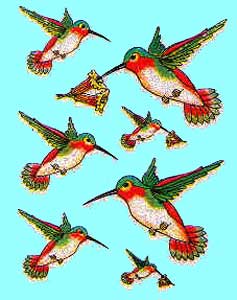
On Never Feeding Hummingbirds Too Concentrated a Nectar
"The hummingbird competes
with the stillness of the air."
-Chogyam Trungpa Rinpoche
(1940-1987)
(1940-1987)
Recipes for hummingbird nectar call for a water to sugar ratio of 4:1. But some people who keep hummingbird feeders insist on making stronger concentrates either from the belief that more is better, or they mix a stronger solution only in late summer & autumn under a widespread but misguided belief that this will "fatten 'em up" for their migration.
The unwavering rule is: "Never mix nectar stronger than the 4:1 ratio, or you may be doing injury to the hummingbirds." A friend who refused to believe her old practice was harmful finally changed her policy (of providing stronger autumn concentrates) when I wrote her the following commentary.
I doubt you're doing great harm since late-season hummers will be transient visitors & won't eat often of the unhealthy concentrate. You'd hurt them more giving them too concentrate a nectar when they are nesting, as they'd be using nearby feeders too regularly during that time. But overly sugared nectars can be harmful at any time if too often encountered, & in no case does increasing the ratio strengthen them for their winter journey. Here's an overview of why it's bad for their health:
Sugar water may supplement hummingbird diet but if they are so fond of sugar water that they neglect their natural diet of flower nectar & small insects, they will become deficient in scores of minute but essential nutrients. Too much sugar might actually hamper their search for the more appropriate natural nectars. Ideally sugar-water feeders are not the only things the hummers find in a garden which will be full of trumpet-shaped spring & summer flowers, or for summer & autumn such things as sage-blossoms, especially in reds, either planted in the garden or set about in pots. Providing potted plants in autumn bloom would be much more an energy-boost than more concentrated sugarwater for their autumn/winter journey. A big abelia will be in full flower through all of autumn, a favorite for hummingbirds that are still hanging about.
Some hummers actually reject over-sugared artificial nectars, & good thing they do since it is unhealthy for them. But others will favor feeders with the most sugar in the water & they may come from greater distances from their nests to feed, overlooking more healthful flower-sources along the way, knowing where they can get the bigger but mineral-deficient sugar load. These hummers become sickly & neglect their nests & are away from their nests too long at a stretch.
Those hummingbirds fed too much sugar can develop calcium deficiencies, muscular weakness, & bone malformations similar to rickets. Their eggs are apt to be soft-shelled & will not hatch. Some hummingbirds appear to show signs of illness resembling drunkenness when feeders contain too much sugar.
Over sugaring their nectar also encourages rapid bacterial growth in the feeders & will attract bees, wasps, & bee-flies.
Too much water is less harmful than too much sugar, though both can be harmful, as too little sugar could cause some hummers to not get their daily caloric requirement.
I have planted for hummingbirds & I do not supplement their diet artificially. I have blooms for them persistently from spring through most of autumn, & in our zone the hummers are usually gone before the autumn-flowering sages & asters & Hibiscus moscheutos & abelias are done, so there's never a time when they cannot find something that is a favorite. It might be possible to make the hummers linger a bit beyond October if I were to hang the garden with feeders too, but I seem to have plenty of visits from the little things just by planting the flowers they like best, assuring them the very finest/ideal/natural nectars with all the required nutrients.
It is further important to garden organically since hummingbirds eat many soft-bodied insects & are susceptible to chemical pollutants. If pesticides are used in the garden, the birds will either not find the insects they require, or they will find them & get a dose of toxins while they're at it.
See also the article
"Are Red Dyes Injurious to Hummingbirds?"
"Are Red Dyes Injurious to Hummingbirds?"